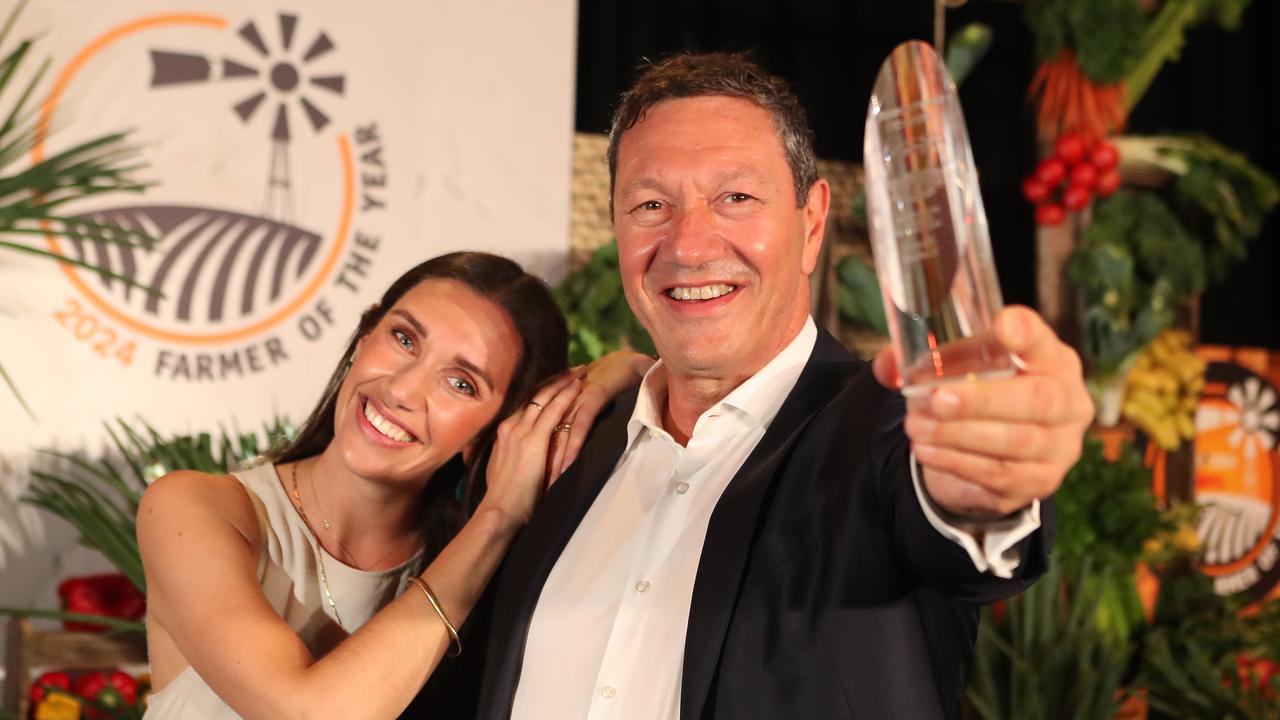Mountain Blue wins The Weekly Times Coles 2020 Horticulture Farmer of the Year
A pioneering family who have built an impressive blueberry breeding and growing enterprise have been crowned Australia’s best horticulture farmer. Meet all the finalists.
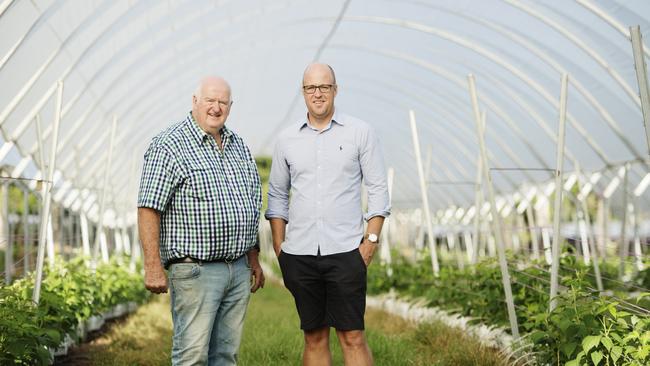
AUSTRALIA’S top beef, cropping, dairy, horticulture, innovative and sheep farmers have been recognised at The Weekly Times Coles 2020 Farmer of the Year Awards. These three growers were in the running for the title of Horticulture Farmer of the Year.
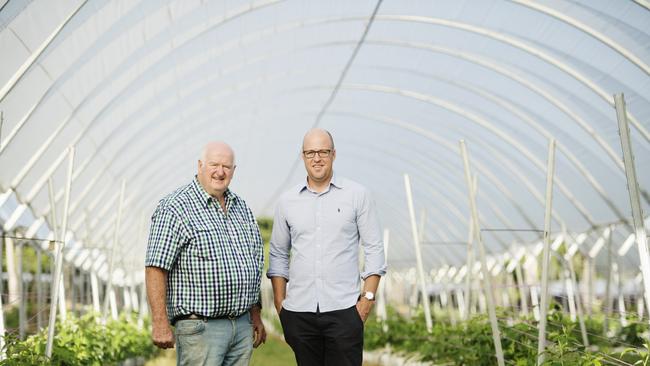
WINNER: BELL FAMILY, MOUNTAIN BLUE
Tabulam, NSW
THE Bell family has found rhythm with the blues.
Forty years after horticulture pioneer Ridley Bell first introduced blueberries to Australia, his family’s Mountain Blue business in the NSW Northern Rivers region has grown into one of the largest blueberry breeding, farming and marketing businesses in the world.
While Ridley — who turned 70 last year — is still involved in the business, heading up its research and development arm, his son, Andrew, is the managing director and charged with the enormous job of overseeing 147 hectares of its plantings grown on four properties in two states, a commercial nursery, 27 new varieties registered worldwide and grown in 24 nations, as well as 80 permanent staff from geneticists and lab technicians to pickers and packers.
“Our genetics program is by far the biggest part of our business, everything else exists because of our genetics,” Andrew says.
“We’re second only to Florida University, which has been breeding for a long time … it’s because of Dad’s passion, to the point of obsession.”
The genetics program is run at Tabulam, as well as on joint-venture properties in Victoria and north Queensland. Tabulam is also home to Mountain Blue’s biggest production facility, with 410,000 blueberry bushes planted. The business operates another two properties in NSW, and one in Queensland, and is also supported by third-party growers across Australia.
About 95 per cent of Mountain Blue’s blueberries are sold to domestic markets with the remaining 5 per cent exported, mostly to Asia and the United Arab Emirates.
In 2017 the company also added another property to its portfolio with a joint venture in India. In 2019 five hectares was planted as a trial on the Indian property, with the first harvest in April and May last year, and further expansion expected.
Andrew says the focus is now on creating a premium blueberry supply 12 months of the year and varieties that can be picked mechanically.
They are also seeking to expand their berry basket, growing 80,000 raspberry plants since 2018 and working towards a breeding program for blackberries, which they hope will be commercial by 2022. Mountain Blue has also recently entered a joint venture with strawberry producer Sunny Ridge to market strawberries.
Their berry positive outlook makes Mountain Blue an outstanding winner of The Weekly Times Coles 2020 Horticulture Farmer of the Year.
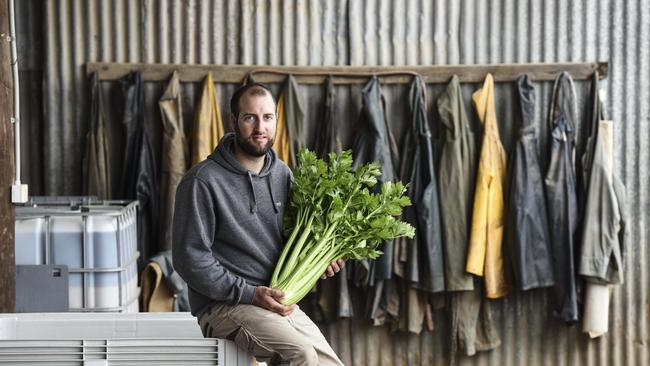
FINALIST: BUSCH FAMILY, BUSCH ORGANICS
Lindenow, VIC
BUSCH tucker takes on a whole new meaning on the fertile Mitchell River flats of Victoria’s East Gippsland.
The Busch family will this year notch up a century of continuously farming horticultural crops in the region, with the past two decades certified organic.
Fourth-generation Kane Busch says the cumulative power of generational knowledge had led to farming efficiency and for four years they have posted an annual growth of 30 per cent.
“It has taken us 100 years to reach our peak,” Kane says.
“Definitely demand for organic has grown, but what has driven the growth is we’ve become better, more efficient and resilient organic farmers with reliable markets.”
Danish immigrant Eiler Busch first started farming on the fertile soils of Lindenow in 1921, the same land now farmed by Kane, his brothers Matt and Damien, parents, Chris and Rosette, and six full-time staff.
Busch Organics grows six vegetable crops – beetroot, broccoli, beans, celery, cabbage and leek – year-round on 120 hectares over two properties, at Lindenow and a leased block at Stratford. Soil health is paramount with crops rotated between the two properties, cover crops grown during winter to act as insurance policy for their topsoil in the event of a flood and shelter belts and buffer zones planted to home beneficial insects such as lady bugs.
Harvested vegetables – beetroot is the biggest crop, by weight, yielding about 1000 tonnes annually – are packed and stored in an on-farm packing facility and trucked daily to wholesale markets in Melbourne, Sydney and Brisbane, as well as through pre-packers in Adelaide, which on-sell to export markets.
Ultimately, father-of-two Kane says while farming generally — but also farming organically — has its frustrations, the family never regrets becoming certified.
“We’ve now got the fifth generation coming on and I love that my boys can eat really safe, healthy food, and if they want, they have the opportunity to work on a farm that will last many more generations,” he says.
READ MORE ABOUT BUSCH ORGANICS
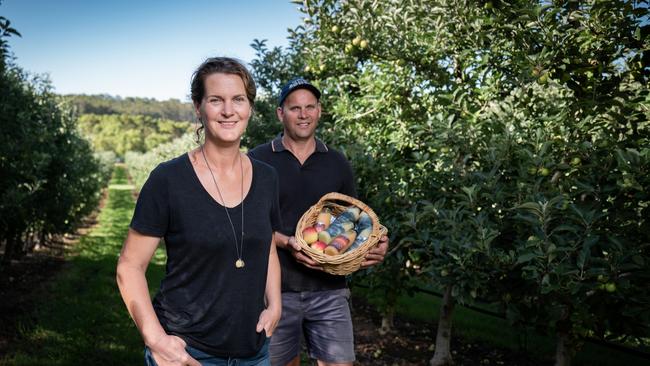
FINALIST: GIBLETT FAMILY, NEWTON ORCHARDS
Manjimup, WA
WASTE is a dirty word for West Australian farmer Nic Giblett. So much so, as director of her family-run Newton Orchards, Nic has declared war on it.
Newton Orchards produces about 6000 tonnes of apples a year at Manjimup, 300km south of Perth. Nic estimates that about 1000 tonnes of fruit, worth about $1 million, from the business is discarded each year due to not meeting exacting supermarket specifications. To counter this, and help recoup financial losses, she has launched a suite of value-add products made from waste apples, such as apple juice, craft cider, apple spirits and brandy. The business also supplies craft-cider makers with 500 tonnes of apples annually and has embraced new avenues for “flawed-but-adored” produce.
Nic, a former journalist, has also initiated two social-media hashtags – #choosethebruise and #chooseugly – appealing to consumers to “stop eating with their eyes and appreciate local produce grown to strict standards”.
“It’s largely a cosmetic issue. They still taste great but they’re not perfect,” she says. “Two decades ago consumers would have eaten them but not now.”
Nic says the family’s war on waste extends to the packhouse where they have replaced plastic punnets with recycled cardboard and reduced plastic wrap weight from 30 to 20 micron, the lowest available. That alone has saved about 10 tonnes a year just in packaging.
Concentrating on waste has proved pivotal for Newton Orchards, which was started by Nic’s grandfather and his brother in 1929 and is now run by Nic, her father, Harvey, and brother, Michael, working alongside a chief executive. The business employs 70 full-time staff and about 100 seasonal casuals across seven properties and 200 hectares of royal gala, sundowner and, more recently, Kanzi, Bravo and Jazz apple trees.
Most apples are sold through the major supermarkets, as well as the Perth wholesale market, with a small amount exported to Dubai, Singapore and Malaysia.
“My motto is do the next right thing. We’re doing whatever we can afford to try and clean our environmental footprint as best as we can,” Nic says. “It’s a non-negotiable, which is also driven by a financial edge.”
READ MORE ABOUT NEWTON ORCHARDS
MORE 2020 FARMER OF THE YEAR WINNERS:
DAIRY
SHEEP
INNOVATIVE

